On March 13…
“I think the girl who is able to earn her own living and pay her own way should be as happy as anybody on earth. The sense of independence and security is very sweet. I declare to you that woman must not depend upon the protection of man, but must be taught to protect herself, and there I take my stand.”
~Susan B. Anthony
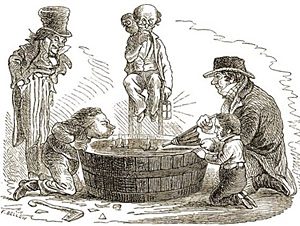
1852 – “Uncle Sam” made his debut as a cartoon character in the New York Lantern.
He was seen in an editorial cartoon titled “Raising the Wind; or, Both Sides of the Story,” criticizing United States policies on shipping.
Cartoonist Frank Bellew depicted John Bull of Great Britain, pumping a bellows to help his ships sail across a small tub. Uncle Sam, a fellow with a big hat and striped pants, stood on the side and watched.
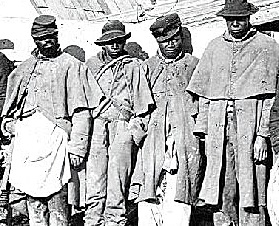
1865 – With the main Rebel armies facing long odds against much larger Union armies, the Confederacy, in a desperate measure, reluctantly approved the use of black troops. General Patrick Cleburne had suggested enlisting slaves a year before, but few in the Confederate leadership considered the proposal, since slavery was the foundation of Southern society.
General Robert E. Lee asked that the slaves be freed as a condition of fighting, but the bill that passed the Confederate Congress did not stipulate freedom for those who served.
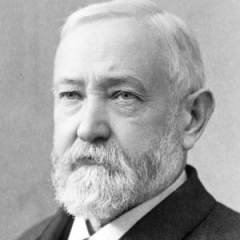
1901 – Benjamin Harrison, the 23rd president of the United States, died from pneumonia at the age of 67.

1906 – Susan B. Anthony, feminist who played a pivotal role in the women’s suffrage movement, died of heart failure and pneumonia at the age of 86.

1933 – Joseph Goebbels was named Nazi Germany’s Minister of Information and Propaganda.
He quickly gained and exerted control over arts and information in Germany. One of his strategies involved using the relatively new media of radio and film for propaganda purposes.
Topics for party propaganda included antisemitism and attacks on Christian churches.

1938 – Defense attorney Clarence S. Darrow – best known for defending teenage killers Leopold and Loeb, and for defending John T. Scopes in the “Scopes Monkey Trial” – died at the age of 80.

1943 – The Nazis – under the orders of Krakow-Plaszow concentration camp commandant Amon Göth – began to shut down the Jewish ghetto in the Polish city of Krakow.
Eight thousand Jews deemed able to work were transported to the Plaszow labor camp. Approximately 2,000 were taken to Auschwitz-Birkenau. Those deemed unfit for work – some 2,000 Jews – were killed in the streets of the ghetto.
Industrialist Oskar Schindler was aware of the plans because of his Wehrmacht contacts, and had his workers stay at his factory overnight to prevent them coming to harm.
Schindler witnessed the liquidation of the ghetto and was appalled. He resolved to do everything within his power to save Jews from the Krakow Ghetto.

1943 – A plot to kill Adolf Hitler failed twice in one day. As Hitler visited troops on the Eastern Front, a group of officers were to shoot Hitler collectively at a signal in the officers’ mess during lunch but that plan was called off at the last minute.
Phase 2: General Hermann Henning von Tresckow arranged to have a bottle of liqueur placed into the casing of a British magnetic mine, with a timer consisting of a spring which would be gradually dissolved by acid, and put on board Hitler’s plane.
When Hitler landed safely at his East Prussian headquarters, it became obvious that the bomb had failed to detonate. The extremely low temperatures in the unheated luggage compartment had prevented the fuse from working.
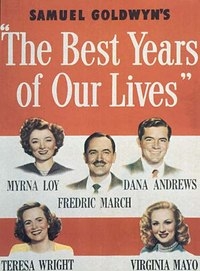
1947 – At the 19th Academy Awards, The Best Years Of Our Lives was named Best Picture and William Wyler won Best Director for the same film.
Fredric March (The Best Years Of Our Lives) was the winner of the Best Actor Award, while Olivia de Havilland (To Each His Own) won Best Actress.
Snowflake Factoid: It’s A Wonderful Life was nominated for five Academy Awards, including Best Picture, Best Director (Frank Capra) and Best Actor (James Stewart), but were shut out.
The film did, however, receive a Technical Achievement Award for the development of a new method of simulating falling snow on motion picture sets.
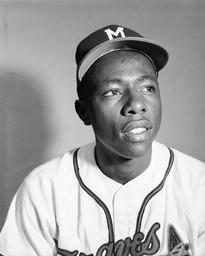
1954 – Milwaukee Braves outfielder Bobby Thomson fractured his ankle sliding into second base during a spring training game.
The Braves replaced him with a 20-year old rookie named Hank Aaron.

1961 – Ricky Nelson recorded Travelin’ Man.
Songwriter Jerry Fuller wrote it with Sam Cooke in mind, but Cooke’s manager was unimpressed and did not keep the demo, which eventually wound up being passed along to Nelson.
His version reached #1 on the Billboard Hot 100, and its B-side, Hello Mary Lou, reached #9 on the same chart.
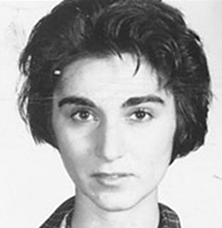
1964 – Catherine “Kitty” Genovese was stabbed to death near her Queens, New York, home.
The case came to be a symbol of urban apathy, though initial reports that 38 neighbors ignored Genovese’s calls for help have been disputed.
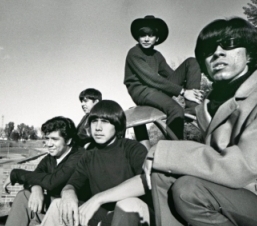
1966 – Question Mark & The Mysterians recorded 96 Tears in a home studio in Bay City, Michigan.
500 copies were distributed locally on a record label called Pa-Go-Go Records. Within months, the record had caught on nationally, and the group licensed the song to Cameo Parkway Records.
By October, it was the #1 song on the Billboard singles chart.
Young Factoid: Keyboardist “Little Frank” Rodriguez played a Vox Continental on the song. He had just turned … 14 years old.

1973 – Ringo Starr recorded I’m The Greatest … with a little help from his friends.
While Starr was recording the song at Sunset Sound Recorders Studio in Los Angeles (along with John Lennon – who wrote the song – Billy Preston and Klaus Voormann), George Harrison, in town to produce a new album by Ravi Shankar, stopped by and joined in on lead guitar.

1996 – 43-year-old Thomas Hamilton burst into the gymnasium of the Dunblane Primary School (Scotland) with four guns and opened fire on a kindergarten class.
Sixteen children and their teacher, Gwenne Mayor, were fatally shot before Hamilton turned the gun on himself. Twelve other children in the class, along with one other adult, were injured.
Hamilton was a single man who lived in public housing in the nearby town of Stirling. A former Boy Scout leader, he had resigned in 1974 following allegations of improper behavior but during the 1980s formed his own youth athletic clubs.
The shooting deeply shocked the Scottish village of 9,000 people and led to the passage of more stringent gun bans by the British government.
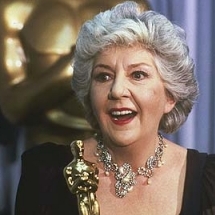
2006 – Academy Award winning actress Maureen Stapleton died of chronic obstructive pulmonary disease at the age of 80.
She was nominated four times for an Academy Award for Best Supporting Actress: Lonelyhearts, Airport, Interiors and Reds, which earned her an Oscar.
Weekend Bonus Information
ON MARCH 14…

1958 – Perry Como’s Catch A Falling Star became the first single to receive a Recording Industry Association of America (RIAA) gold record certification (sales of over 500,000 copies).

1964 – A jury in Dallas found Jack Ruby guilty of murdering Lee Harvey Oswald, the accused assassin of President John F. Kennedy, and sentenced him to death.
Ruby’s conviction was successfully appealed, and he was granted a new trial. However, as the date for his new trial was being set, Ruby became ill in prison and died of a pulmonary embolism from lung cancer on January 3, 1967.
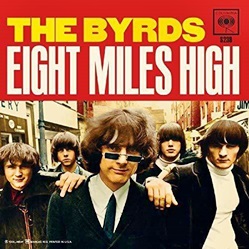
1966 – The Byrds released Eight Miles High.
The song was subject to a radio ban in several American markets, following allegations regarding perceived drug connotations in its lyrics. Principal songwriter Gene Clark maintained the song was written while drugs were being experienced, but the lyrics were inspired by the band’s trip to England.
“Rain gray town, known for its sound.”
The ban had a definite effect. The single peaked at #14 on the Billboard Hot 100.
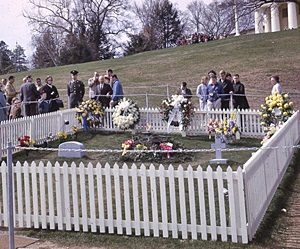
1967 – President John F. Kennedy’s body was moved from a temporary grave to a permanent memorial site at Arlington National Cemetery.
Foot traffic from visitors to the original gravesite was far more than officials expected, and Jacqueline Kennedy wanted to install an eternal flame as a memorial at his gravesite. The first installation of the flame (for the funeral) was a rush job, and proper piping had to be installed so the flame would be truly eternal.
On the left is the headstone of his son Patrick Bouvier Kennedy, who was born premature and died after two days. On the right is the cross headstone of stillborn daughter Arabella.
In the middle is a mound of evergreen boughs, covering the top of JFK’s grave and the base of the temporary installation of the eternal flame.
JFK’s final resting place, which is only a few feet from the original site, took 2 years to construct. He was re-interred in a private ceremony attended by Jackie, his brothers Robert and Ted, and President Lyndon Johnson.

1969 – John Lennon and Yoko Ono made a sudden decision to marry but a myriad of problems got in the way.
The initial plan was to have the captain of a ferry perform the ceremony at sea but that was quickly ruled out by authorities.
They were then left standing on the dock in Southampton as they tried to board a ferry to France with an alternative destination of Holland. Due to passport issues, they were told they could not depart.
Lennon called Peter Brown, a close friend and an executive at Apple Records, and asked him to intercede.
Brown called back and informed him that he could get married in Gibraltar because it was a British protectorate and Lennon was a British citizen.
And on March 20, the couple finally were married “in Gibraltar, near Spain.”
Rock Factoid: As any Beatles fan knows (or should), the incident became the opening verse in The Ballad Of John & Yoko, which was recorded a month later by just Lennon and Paul McCartney:
“Standing in the dock at Southampton
Trying to get to Holland or France
The man in the mac said, ‘You’ve got to go back’
You know they didn’t even give us a chance.”
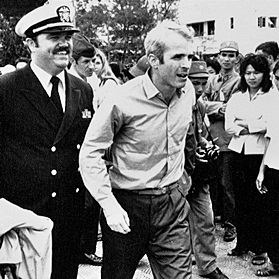
1973 – After being held as a prisoner of war in North Vietnam for five and a half years and subjected to a program of severe torture, lieutenant commander John McCain – along with 108 other prisoners of war – was released by his captors.
He had been captured on October 26, 1967 as he was flying his 23rd bombing mission when his A-4E Skyhawk was shot down by a missile over Hanoi.
His wartime injuries and the constant beatings left him permanently incapable of raising his arms above his head.

1999 – Actor Kirk Alyn died at the age of 88 from Alzheimer’s disease.
He was best known for being the first actor to play the character of Superman. He appeared in two 15-part movie serials, Superman (1948) and Atom Man Vs Superman (1950).
He was offered the part of Superman for the television version in 1951, but he turned it down. The part went to George Reeves.
ON MARCH 15…
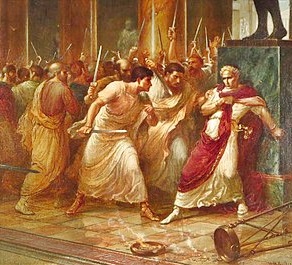
44 B.C. – Beware the Ides of March.
Roman dictator Julius Caesar was assassinated by a group of nobles that included Brutus, Cassius, and someone else you rarely hear about.
As far as epic betrayals go, history tends to place Brutus in the same league as Judas. In reality, that infamy should be reserved for someone named Decimus Junius Brutus Albinus.
It was Decimus who dined with Caesar the night before the assassination and convinced him to leave his house the next morning (he was staying home because his wife, Calpurnia, was worried).
Decimus’ betrayal followed an adult life spent at Caesar’s side. Brutus, however, had often fought against Caesar, and he only came over to Caesar’s side after a handsome cash award and profitable political appointment.
Et tu, Brute Factoid: This might be the most powerful myth of all regarding Caesar’s murder. Though Caesar’s last words are not known with any certainty, Roman historian Suetonius claimed Caesar said no such thing to Brutus.
While in Hollywood and at the theatre, there is always a time for dialogue, but in real life, less talk and more action tends to be the best course to improve the odds of staying alive.
Further, once one has been stabbed numerous times throughout the body (23 times in this case), taking the time to calmly ask one of your attackers a question – “Et tu, Brute?” – seems highly unlikely.
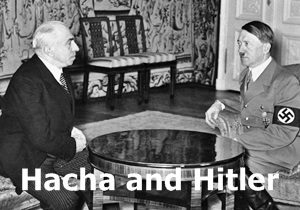
1939 – Adolf Hitler, reneging on his pledge in the Munich Agreement, summoned Czech President Emil Hacha to a 1:30 a.m. meeting at the Reich Chancellery in Berlin and informed him of an impending attack by Germany.
Hitler then gave Hacha two options: cooperate with Germany, in which case the “entry of German troops would take place in a tolerable manner and permit Czechoslovakia a generous life of her own, autonomy and a degree of national freedom…” or face a scenario in which “resistance would be broken by force of arms, using all means.”
Hacha suffered a heart attack induced by Field Marshal Hermann Goering’s threat to bomb the Czech capital and by 4:00 a.m. he contacted Prague, effectively “signing Czechoslovakia away” to Germany.
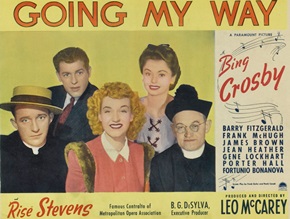
1945 – At the 17th Academy Awards, Going My Way won Best Picture.
Bing Crosby won the Best Actor Oscar for Going My Way, while Barry Fitzgerald won Best Supporting Actor and Leo McCarey won Best Director for the same film
Ingrid Bergman won the Best Actress award for her role in Gaslight.
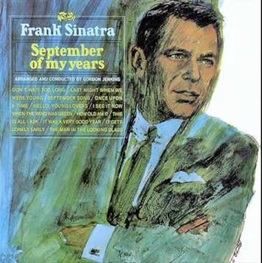
1966 – At the 8th Grammy Awards, Frank Sinatra won Album of The Year for September Of My Years.
The other nominees were Barbra Streisand (My Name Is Barbra), Eddy Arnold (My World), Julie Andrews and Cast (The Sound of Music) and the Beatles (Help!).
The Record of The Year went to Herb Alpert & The Tijuana Brass for A Taste of Honey.
The other nominees were Roger Miller (King of The Road), Ramsey Lewis Trio (The In Crowd), the Beatles (Yesterday), and Tony Bennett (The Shadow of Your Smile).
The Song of The Year (honor goes to the songwriter) went to Paul Francis Webster and Johnny Mandel for The Shadow of Your Smile.
The other nominees were Jimmy Van Heusen and Sammy Cahn (September of My Years), John Lennon and Paul McCartney (Yesterday), Michel Legrand, Norman Gimbel and Jacques Demy (I Will Wait For You), and Roger Miller (King of The Road).
No, I am not going to play Herb Alpert’s Record of The Year song. I am playing another nominated song … because I can. 🙂

1972 – The Godfather, Francis Ford Coppola’s epic gangster movie based on the Mario Puzo novel, premiered at Loew’s State Theatre in New York City.
Filmed on a budget of $7 million, The Godfather generated over $280 million at the box office.
At the 45th Academy Awards, the film won the Oscars for Best Picture, Best Actor (Marlon Brando), and Best Adapted Screenplay (for Puzo and Coppola).
In addition, the seven other Oscar nominations included Al Pacino, James Caan, Robert Duvall (all for Best Supporting Actor), and Coppola for Best Director.
Brando boycotted the Academy Awards ceremony and refused to accept the Oscar, becoming the second actor to refuse a Best Actor award after George C. Scott in 1970.
Pacino also boycotted the ceremony. He was insulted at being nominated for the Academy Award for Best Supporting Actor award, noting that he had more screen time than his co-star and Best Actor winner Brando and thus he should have received an Academy Award nomination for Best Actor.
About That Horse Factoid: One of the film’s most shocking moments involved an actual, severed, horse’s head. Coppola received criticism for the scene, although the head was obtained from a dog-food company from a horse that was to be killed regardless of the film.
Don’t Say That Word Factoid: The Italian-American Civil Rights League, led by mobster Joseph Colombo, wanted all uses of the words “mafia” and “Cosa Nostra” removed from the script.
Coppola claimed that Puzo’s screenplay only contained two instances of the word “mafia” being used, while “Cosa Nostra” was not used at all. The two “mafia” references were removed.
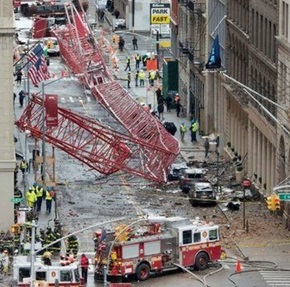
2008 – A construction crane toppled in New York City, killing seven people.
The crane was 200 feet tall at the time of the collapse. The accident occurred when workers were attaching a new steel collar to anchor it to the building at the 18th floor, as part of an operation to extend the crane upwards.
The OSHA investigation determined that instructions for lifting a stabilizing collar to the ninth floor level were not followed, using only half the number of polyester slings recommended.
The overloaded slings failed, causing the collar to drop and dislodge two lower-level collars from the building. This left the crane without any lateral support, allowing it to topple.
Before the crane accident, New York City Department of Buildings had already issued 13 citations for safety violations at the construction site, two of which were considered serious violations.
New York City Mayor Michael Bloomberg later stated, to the ire of local residents, that the infractions were normal for a project of that scale.

2014 – Comedian David Brenner died from pancreatic cancer at the age of 78.
The perpetually grinning Brenner appeared on The Tonight Show 158 times – more appearances than any other guest in history – and guest-hosted the NBC late-night show 75 times between 1975 and 1984, placing him fifth on the list of Johnny Carson’s most frequent guest hosts.
Brenner’s final request asked “that $100 in small bills be placed in his left sock ‘just in case tipping is recommended where I’m going.‘”
Compiled by Ray Lemire ©2020 RayLemire.com / Streamingoldies.com. All Rights Reserved.